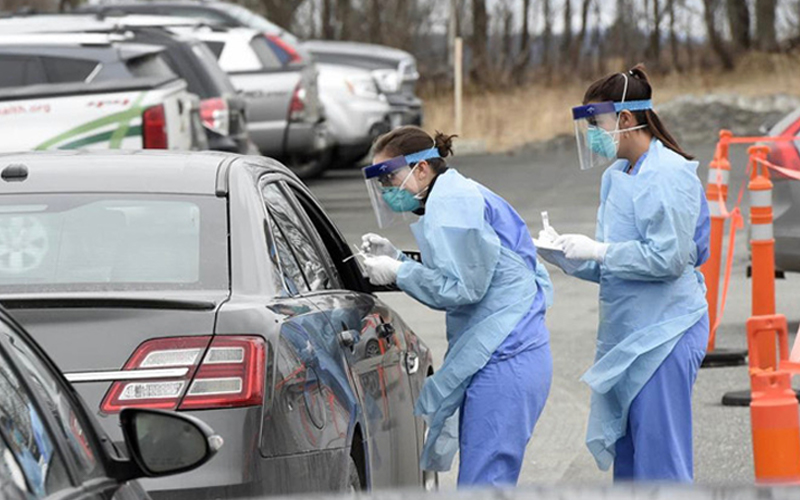As COVID-19 continues to spread throughout Vermont, we, residents of the Mad River Valley, are living in anticipation of a biological tsunami that is forcing us to ask all the “what-if” questions we can muster.
What if I think I have coronavirus? What if I need a test? What if I get it? What if I need to go to the hospital? During a phone interview with The Valley Reporter, Elliott Bent, communications director at Central Vermont Medical Center (CVMC), which has an office in Waitsfield, answered these questions and more while describing the logistics behind a hypothetical Valley-based coronavirus case.
If you live in the Mad River Valley and think you have coronavirus symptoms (fever, cough and shortness of breath), the Mad River Medical center will screen you from your car. Check-in happens over the phone. “It’s an opportunity to limit the amount of time that patients are spending in a waiting room,” said Bent.
The screening involves a Q&A and temperature check. The Q&A portion will happen over the phone and the temperature check, from your car.
Simply presenting coronavirus symptoms won’t ensure you a test referral, however. Due to limited testing supplies, CVMC is currently only testing high-risk individuals, that is, individuals older than 60 with chronic medical conditions, immunocompromised patients, pregnant women, hospitalized patients, health care workers or first responders.
If you meet these testing requirements, you will be referred via your screening to the pop-up testing site in Berlin. There, a masked health worker in a protective suit will administer the test, which involves a deep nasal swab. Like the screening, the test will happen from your car.
Bent was adamant that the pop-up site is only for referred patients. “Because its referral only, we don’t give out the exact address. You can’t just drive up to it,” said Bent.
According to Bent, the pop-up testing site is high tech. “This mobile collection site has Wi-Fi, computers, printers. As soon as anybody is referred, it’s entered into our medical record system and an order pops up on the collection site side,” said Bent. “The specimen is then sent to an offsite testing area. Whoever’s tested can expect a call with results between 24 to 48 hours.”
If you test positive, the CVMC guidelines on ‘What to do if you test positive for COVID-19’ boil down to two points: take care of yourself and try not to infect anyone else. According to the guidelines, if you test positive for coronavirus, you should do the following: stay home, rest, drink plenty of fluids, clean your hands often, don’t go out in public, use a separate bathroom from other family members if possible and continue to check your temperature and monitor your symptoms daily.
Only once you have had no fever for at least the last 72 hours (three full days of no fever without the use of fever-reducing medication), your other symptoms have improved and at least seven days have passed since your symptoms first appeared can self-isolation end if you have tested positive, state the CVMC guidelines.
If your coronavirus infection gets worse instead of better, however, you will need to call 911. “Medical emergencies are treated the same way medical emergencies have always been treated,” said Bent. “If someone is in urgent distress, they should call 911. If someone has an urgent medical emergency, it’s treated the same, only with coronavirus, we have additional safety precautions for paramedics.”
And if you are hospitalized, will the CVMC hospital have enough supplies to provide for your care? Will it be overcrowded? “I think those are items of concern for any health care institution,” said Bent, commenting on lack of supplies and overcrowding. “Our team has been working hard to augment our capacity to take on an influx of patients as needed. And that includes sourcing supplies, adding capacity throughout the hospital.”
“We have seen a tremendous outpouring of support from the community. That includes providing masks and hand sanitizer. We’re thrilled with that,” said Bent. “In terms of what we’re doing internally, we are working around the clock to source that equipment and making sure we’re prepared for this situation.”
Per concerns around capacity, Bent urges people to stay home. “It’s critical that everyone do their part to flatten the curve as much as possible. That looks like staying home unless it’s absolutely necessary to go out. That looks like social distancing, staying at lease 6 feet from folks. It looks like washing or sanitizing your hands regularly. Those are the things that people can be doing right now to try and help preserve the capacity of our health care system.”






